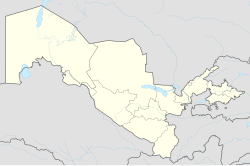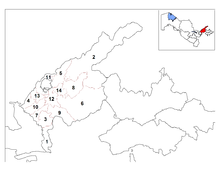Bekobod
|
Bekobod Бекобод |
||
| Basic data | ||
|---|---|---|
| State : |
|
|
| Province: | Toshkent | |
| Coordinates : | 40 ° 13 ′ N , 69 ° 14 ′ E | |
|
|
||
| Height : | 305 m | |
| Residents : | 101,292 (2009) | |
Bekobod ( Cyrillic Бекобод ; Russian Бекабад Bekabad ) is a city in the Uzbek province of Tashkent . According to the 1989 population census, Bekobod had 82,700 inhabitants at that time, according to a calculation for 2009 the population is 101,292.
geography
Bekobod is located about 115 km south of the capital Tashkent at about 305 m above sea level. The city lies on the border with the Tajik province of Sughd and the Uzbek province of Sirdaryo on both banks of the Syr Darya River between the opening of the Ferghana Valley and the Mirzacho'l steppe .
Bekobod is an independent city, the district of the same name Bekobod with the capital Zafar is the southernmost of the province of Tashkent.
history
Bekobod was founded in 1945 as Беговат , Begowat , on the site of a small town; the name was changed to Bekobod / Bekabad in 1964.
In Bekobod there was the prisoner of war camp 288 , Begowat , for German prisoners of war of the Second World War . It was opened with Stalingrad prisoners and only existed during the war. It then very likely went up in POW camp 386 , Tashkent .
Economy and Infrastructure
Bekobod is on the railway line from Xovos to Qo'qon , which runs through the Tajik part of the Fergana Basin . Bekobod is a center of the metal industry; the nearby Farhod dam is important for the electricity and water supply of Uzbekistan.
Culture and sights
Sports
The two-time Uzbek soccer cup winner Metallurg Bekobod is based in Bekobod .
See also
Individual evidence
- ↑ Maschke, Erich (ed.): On the history of the German prisoners of war of the Second World War. Verlag Ernst and Werner Gieseking, Bielefeld 1962–1977.
Web links
- Article Bekabad in the Great Soviet Encyclopedia (BSE) , 3rd edition 1969–1978 (Russian)

